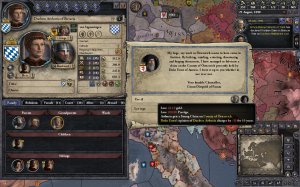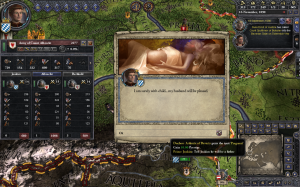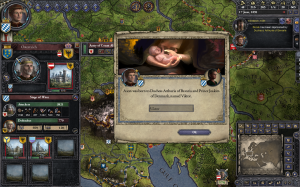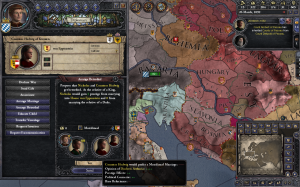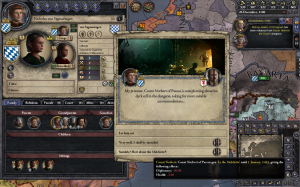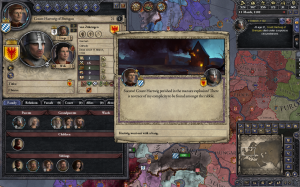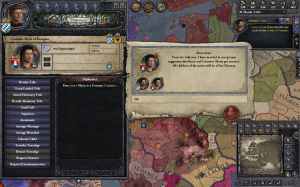Recently a few of my reactionary Twitter friends and I started a CK2 succession game. @ReactoKikaijin played first, as Duke Samuel of Bavaria, but died early and handed the game off to his daughter, Arthuria, as whom I took over. What follows is an AAR the first part of my reign; I haven’t finished yet but already I’ve made a name for the family.
Duchess Arthuria of Bavaria was catapulted into public life at the tender age of 12 when her father, Duke Samuel, died an untimely death. The first few years of her reign were years of uncertainty as she wondered whom in her court she could trust, all the while knowing that until she came of age, her actual influence was limited as she lived under a regency. During this time the government Duchy moved cautiously. Duke Samuel’s High Council was shaken up a bit, notably by the replacement of his spymaster with Prince-Bishop Heinrich of Trent, but other than that little of note happened during the regency.
On 3 March, 1087, Duchess Arthuria came of age and began to rule in her own right.
Shortly afterward she was married to her cousin, Prince Joakim of Denmark, as her father had arranged for her prior to his death.
At some point early in her reign, Duchess Arthuria developed a burning desire, which she would later describe as a ‘divine mission’, to restore the ancient Kingdom of Bavaria. The coming years of her reign would be devoted almost single-mindedly to the dual goal of restoring this kingdom and securing the succession.
To that end, anything that weakened the other lords of the Empire who might be interested in taking the Kingdom, especially the powerful Duke of Carinthia, met with Arthuria’s wholehearted support.
In 1089, Arthuria raised taxes on the Church within her realm. Despite her reputation for devout religiosity, the Duchess was not at all unaware of the vast wealth of the Church, and her coffers were nearly empty at the beginning of her reign. This would prove a wise decision as mercenaries were later responsible in large part for Bavarian military success.
On 2 Feb, 1090, Arthuria gave birth to her first son and heir apparent, Nicholas. She then fell gravely ill for a period of two weeks, during which many in the court feared for her survival. But the Duchess was strongly constituted and bounced back, more determined than ever:
In August of 1090, Arthuria declared a war to seize the County of Osterreich, claiming her right to rule it on the basis of documents that many historians now agree were of dubious validity. She also found herself pregnant with her second child.
In the battles of Osterriech and Salzburg, the Bavarian army wiped out the Austrian one, and the war was effectively over by the time Arthuria’s second son, Viktor, was born.
On 20 Dec, 1091, the official peace was signed and Duchess Arthuria became the Countess of Osterreich, one step closer to restoring the Kingdom of Bavaria.
In March of 1092, Duchess Arthuria arranged a betrothal between her son Nicholas and Countess Hedwig of Karnten, a legal vassal of the Kingdom of Bavaria, in hopes that this would help cement her family’s claim to the throne.
Shortly afterward, she found herself pregnant again, and on 2 December, 1092, gave birth to her third son, Norbert.
During this time, although it had little direct relevance to Bavaria, it is worthy of note from a world perspective that the King of England successfully seized Jersualem back from the Moslems.
In January of 1095, Arthuria’s youngest son Norbert died of pneumonia, which came to be called the Sigmaringen family curse, in remembrance of the fear it had occasioned after Nicholas’s birth.
The death of her son deeply grieved the Duchess, and she withdrew more and more from social life, focusing more and more single-mindedly on her political aspirations.
In May of 1095, to avoid dividing the Duchy between her sons, Duchess Arthuria decreed that succession would henceforth be elective, and immediately nominated Nicholas as her chosen heir. This change came at a cost, however; for the rest of the Duchy’s brief remaining time as an independent realm, her son’s inheritance was always precarious and the vassals had to be kept happy, as Arthuria needed their support to keep her family on the throne after her death.
To that end, Arthuria worked hard to keep Nicholas popular, and much of the increased church taxation was spent on bribes to the counts.
In September of 1097, Duchess Arthuria received a call to war from the Duke of Verona, a distant relative by marriage, but refused. He was attempting to seize the Duchy of Carinthia, but the union of Verona and Carinthia, as Arthuria knew, would make it far harder for her to incorporate Carinthia into its lawful kingdom of Bavaria once she took that title. Despite Arthuria’s inaction, however, and much to her consternation, Duke Berthold did ultimately take Carinthia as his own.
In January of 1098, the Duchess fell pregnant again. It was Prince Joakim’s hope that the birth of this child would help return Arthuria to some kind of normalcy after the loss of Norbert, and indeed, the birth of her fourth son Mathias on 17 August 1098 did seem to bring her out of her depression somewhat.
However, the Duchess had other problems. A critical mass of electors were now favouring her vassal, Count Berthold of Innsbruck, as heir to her throne over her son. Although Berthold was old and Arthuria expected to survive him, in the world of medieval nobility no one was promised tomorrow. After attempts to bribe and cajole the majority back onto her side seemed to fail, Arthuria arranged a ‘hunting accident’ in which Berthold was to be killed.
However, the assassins failed. Arthuria’s involvement was not discovered, and shortly afterward Prince-Bishop Siegfried declared that he now supported Nicholas as heir, restoring his majority among the electors. Arthuria called off her plot against Berthold and no one was the wiser.
However, the college of Electors was still favouring Nicholas by only five votes to four. When Arthuria discovered that one of her enemies among the Electors, Count Norbert of Passau, was involved in an illegal plot, she lost no time in using that excuse to imprison him. Perhaps she hoped he would die sooner in her dungeons and his heir would be more favourable. Perhaps she hoped he would rebel and give her an excuse to revoke his electoral title, though this did not happen. In any case, Norbert would spend the next few years a prisoner of Duchess Arthuria, in the depths of the Oubliette.
During this time, Arthuria also hatched a plot to have her sister’s husband Hartwig killed, as she noted that their daughter, if allowed to succeed, would take her mother’s title out of Arthuria’s suzerainty. After Count Hartwig’s ‘tragic and untimely demise’, Duchess Arthuria arranged a ‘much more suitable’ match in hopes that a son born from it would displace his half-sister and keep his aunt’s realm intact.
In October of 1102, with the support of numerous local nobles, Arthuria produced trumped-up documents that claimed she was rightfully the Duchess of Austria as well as Bavaria
The war to press this claim was swift and virtually uncontested. The Austrian army was crushed, the garrisons quickly surrendered, and by March of 1104, Arthuria had declared herself Duchess of Austria.
However, the former Duke of Austria was now a count in Arthuria’s realm, and unsurprisingly supported himself as heir to it. Fortunately, no one else took him seriously and he was not a threat to either of the established major candidates.
On 21 Jan, 1105, Duchess Arthuria declared that the ancient Kingdom of Bavaria was now restored under her, and by implication, that she was the rightful liege to the remaining still-independent lords of old Bavaria.
Here ends the first part of her chronicle. In Part II we will recount how the Queen used her newfound status and power within the Empire.








